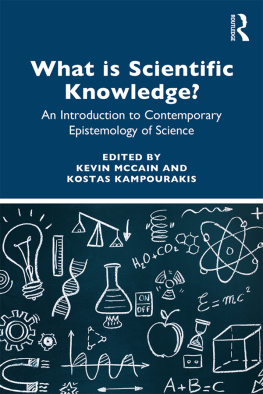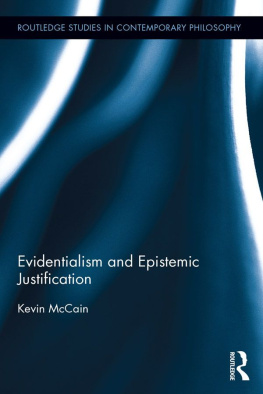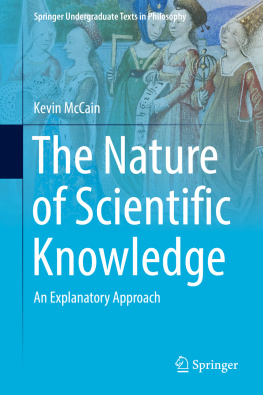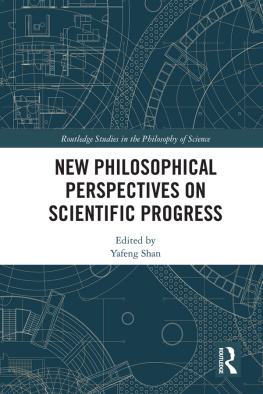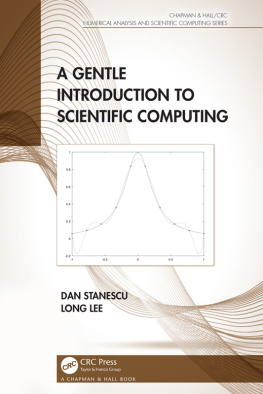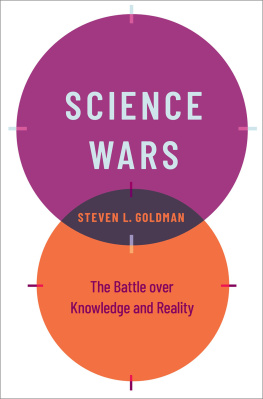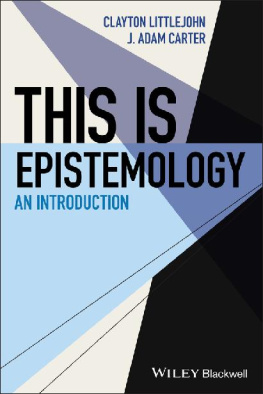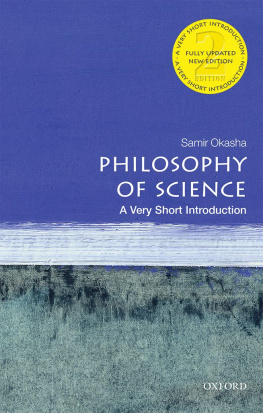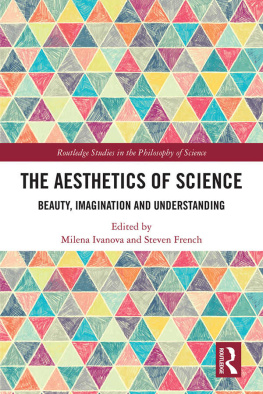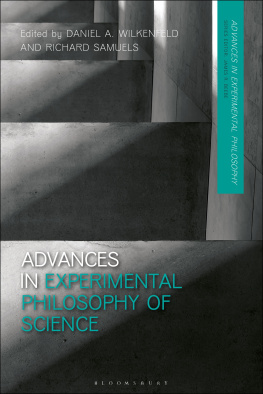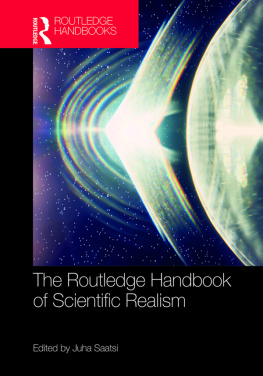What Is Scientific Knowledge?
What Is Scientific Knowledge? is a much-needed collection of introductory-level chapters on the epistemology of science. Renowned historians, philosophers, science educators, and cognitive scientists have authored 19 original contributions specifically for this volume. The chapters, accessible for students in both philosophy and the sciences, serve as helpful introductions to the primary debates surrounding scientific knowledge. First-year undergraduates can readily understand the variety of discussions in the volume, and yet advanced students and scholars will encounter chapters rich enough to engage their many interests. The variety and coverage in this volume make it the perfect choice for the primary text in courses on scientific knowledge. It can also be used as a supplemental book in courses in epistemology, philosophy of science, and other related areas.
Key features:
- an accessible and comprehensive introduction to the epistemology of science for a wide variety of students (both undergraduate- and graduate-level) and researchers
- written by an international team of senior researchers and the most promising junior scholars
- addresses several questions that students and lay people interested in science may already have, including questions about how scientific knowledge is gained, its nature, and the challenges it faces.
Kevin McCain is Associate Professor of Philosophy at the University of Alabama at Birmingham, USA. His published research includes Evidentialism and Epistemic Justification (2014), The Nature of Scientific Knowledge: An Explanatory Approach (2016), and, with Kostas Kampourakis, Uncertainty: How It Makes Science Advance (2019).
Kostas Kampourakis is a researcher in science education and a lecturer at the University of Geneva, Switzerland. His most recent authored books are Making Sense of Genes (2017), Turning Points: How Critical Events Have Driven Human Evolution, Life and Development (2018), and, with Kevin McCain, Uncertainty: How It Makes Science Advance (2019). He has also co-edited, with Michael Reiss, Teaching Biology in Schools: Global Research, Issues and Trends (2018).
What Is Scientific Knowledge?
An Introduction to Contemporary Epistemology of Science
Edited by Kevin McCain and Kostas Kampourakis

First published 2020
by Routledge
52 Vanderbilt Avenue, New York, NY 10017
and by Routledge
2 Park Square, Milton Park, Abingdon, Oxon, OX14 4RN
Routledge is an imprint of the Taylor & Francis Group, an informa business
2020 Taylor & Francis
The right of Kevin McCain and Kostas Kampourakis to be identified as the authors of the editorial material, and of the authors for their individual chapters, has been asserted in accordance with sections 77 and 78 of the Copyright, Designs and Patents Act 1988.
All rights reserved. No part of this book may be reprinted or reproduced or utilised in any form or by any electronic, mechanical, or other means, now known or hereafter invented, including photocopying and recording, or in any information storage or retrieval system, without permission in writing from the publishers.
Trademark notice: Product or corporate names may be trademarks or registered trademarks, and are used only for identification and explanation without intent to infringe.
Library of Congress Cataloging-in-Publication Data
A catalog record for this title has been requested
ISBN: 978-1-138-57016-0 (hbk)
ISBN: 978-1-138-57015-3 (pbk)
ISBN: 978-0-203-70380-9 (ebk)
Typeset in Bembo
by Newgen Publishing UK
Contents
Jeroen de Ridder
Thomas A.C. Reydon
Olaf Dammann, Ted Poston, and Paul Thagard
Kevin McCain
Henk W. de Regt and Christoph Baumberger
Theodore Arabatzis
Stephen Law
Carrie S. I. Jenkins
Richard Fumerton
Hanne Andersen
Andrew Shtulman and Andrew Young
Susan A. Gelman and Kristan A. Marchak
Erik L. Peterson
Janet A. Kourany
Matthew J. Brown
Martin Curd and Dana Tulodziecki
Sara Gottlieb and Tania Lombrozo
Rik Peels
Kostas Kampourakis
Hanne Andersen is Professor of Philosophy of Science at the University of Copenhagen, Denmark. Her publications include On Kuhn (2001), The Cognitive Structure of Scientific Revolutions (with Peter Barker and Xiang Chen, 2006), and the entry on scientific method in the Stanford Encyclopedia of Philosophy (with Brian Hepburn).
Theodore Arabatzis is Professor of History and Philosophy of Science at the National and Kapodistrian University of Athens. He has published on the history of modern physical sciences and on historical philosophy of science. His publications include Representing Electrons: A Biographical Approach to Theoretical Entities (2006).
Christoph Baumberger is Senior Researcher at the Department of Environmental Systems Science, Swiss Federal Institute of Technology Zurich, Switzerland. He published (with Stephen R. Grimm and Sabine Ammon) Explaining Understanding: New Perspectives from Epistemology and Philosophy of Science (2017).
Matthew J. Brown is Associate Professor of Philosophy and the History of Ideas and Director of the Center for Values in Medicine, Science, and Technology at the University of Texas at Dallas. His published work in the history and philosophy of science has focused primarily on values in science, feminism and science, and science for policy. He has a book in progress, Science and Moral Imagination: A New Ideal for Values in Science.
Martin Curd is the co-author and co-editor (with Jan Cover and Christopher Pincock) of Philosophy of Science: The Central Issues (2013) and co-editor (with Stathis Psillos) of The Routledge Companion to Philosophy of Science (2014). He retired from Purdue University in 2018.
Olaf Dammann is Professor and Vice Chair of Public Health and Community Medicine at Tufts University School of Medicine, Boston. He is also a PhD candidate in Philosophy at the University of Johannesburg, South Africa. He has more than 200 publications in neuropediatrics, neonatology, epidemiology, philosophy of science and recently published (with Ben Smart) the book Causation in Population Health Informatics and Data Science (2019).
Henk W. de Regt is Professor of Philosophy of Natural Sciences at the Institute for Science in Society, Radboud University Nijmegen. He published Understanding Scientific Understanding (2017) and (with Sabina Leonelli and Kai Eigner) Scientific Understanding: Philosophical Perspectives (2009).
Jeroen de Ridder is Associate Professor of Philosophy at Vrije Universiteit Amsterdam and Professor by special appointment of Christian Philosophy at the University of Groningen. His work in social epistemology has appeared in journals such as The Australasian Journal of Philosophy, Synthese, Erkenntnis, and Episteme

